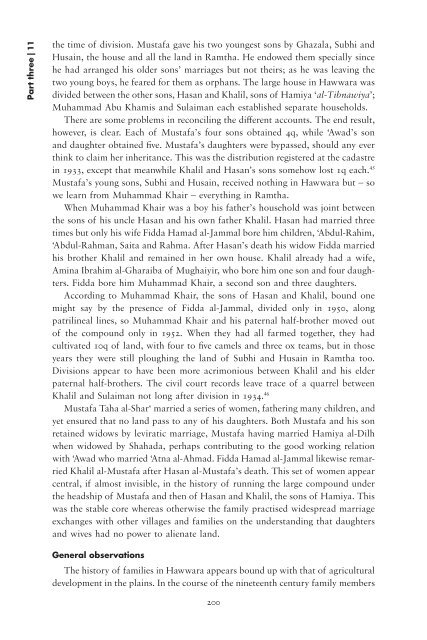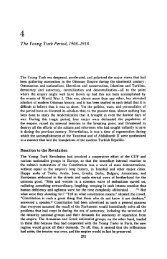Governing property, making the modern state - PSI424
Governing property, making the modern state - PSI424
Governing property, making the modern state - PSI424
You also want an ePaper? Increase the reach of your titles
YUMPU automatically turns print PDFs into web optimized ePapers that Google loves.
Part three | 11<br />
<strong>the</strong> time of division. Mustafa gave his two youngest sons by Ghazala, Subhi and<br />
Husain, <strong>the</strong> house and all <strong>the</strong> land in Ramtha. He endowed <strong>the</strong>m specially since<br />
he had arranged his older sons’ marriages but not <strong>the</strong>irs; as he was leaving <strong>the</strong><br />
two young boys, he feared for <strong>the</strong>m as orphans. The large house in Hawwara was<br />
divided between <strong>the</strong> o<strong>the</strong>r sons, Hasan and Khalil, sons of Hamiya ‘al-Tibnawiya’;<br />
Muhammad Abu Khamis and Sulaiman each established separate households.<br />
There are some problems in reconciling <strong>the</strong> different accounts. The end result,<br />
however, is clear. Each of Mustafa’s four sons obtained 4q, while ‘Awad’s son<br />
and daughter obtained five. Mustafa’s daughters were bypassed, should any ever<br />
think to claim her inheritance. This was <strong>the</strong> distribution registered at <strong>the</strong> cadastre<br />
in 1933, except that meanwhile Khalil and Hasan’s sons somehow lost 1q each. 45<br />
Mustafa’s young sons, Subhi and Husain, received nothing in Hawwara but – so<br />
we learn from Muhammad Khair – everything in Ramtha.<br />
When Muhammad Khair was a boy his fa<strong>the</strong>r’s household was joint between<br />
<strong>the</strong> sons of his uncle Hasan and his own fa<strong>the</strong>r Khalil. Hasan had married three<br />
times but only his wife Fidda Hamad al-Jammal bore him children, ‘Abdul-Rahim,<br />
‘Abdul-Rahman, Saita and Rahma. After Hasan’s death his widow Fidda married<br />
his bro<strong>the</strong>r Khalil and remained in her own house. Khalil already had a wife,<br />
Amina Ibrahim al-Gharaiba of Mughaiyir, who bore him one son and four daughters.<br />
Fidda bore him Muhammad Khair, a second son and three daughters.<br />
According to Muhammad Khair, <strong>the</strong> sons of Hasan and Khalil, bound one<br />
might say by <strong>the</strong> presence of Fidda al-Jammal, divided only in 1950, along<br />
patrilineal lines, so Muhammad Khair and his paternal half-bro<strong>the</strong>r moved out<br />
of <strong>the</strong> compound only in 1952. When <strong>the</strong>y had all farmed toge<strong>the</strong>r, <strong>the</strong>y had<br />
cultivated 10q of land, with four to five camels and three ox teams, but in those<br />
years <strong>the</strong>y were still ploughing <strong>the</strong> land of Subhi and Husain in Ramtha too.<br />
Divisions appear to have been more acrimonious between Khalil and his elder<br />
paternal half-bro<strong>the</strong>rs. The civil court records leave trace of a quarrel between<br />
Khalil and Sulaiman not long after division in 1934. 46<br />
Mustafa Taha al-Shar‘ married a series of women, fa<strong>the</strong>ring many children, and<br />
yet ensured that no land pass to any of his daughters. Both Mustafa and his son<br />
retained widows by leviratic marriage, Mustafa having married Hamiya al-Dilh<br />
when widowed by Shahada, perhaps contributing to <strong>the</strong> good working relation<br />
with ‘Awad who married ‘Atna al-Ahmad. Fidda Hamad al-Jammal likewise remarried<br />
Khalil al-Mustafa after Hasan al-Mustafa’s death. This set of women appear<br />
central, if almost invisible, in <strong>the</strong> history of running <strong>the</strong> large compound under<br />
<strong>the</strong> headship of Mustafa and <strong>the</strong>n of Hasan and Khalil, <strong>the</strong> sons of Hamiya. This<br />
was <strong>the</strong> stable core whereas o<strong>the</strong>rwise <strong>the</strong> family practised widespread marriage<br />
exchanges with o<strong>the</strong>r villages and families on <strong>the</strong> understanding that daughters<br />
and wives had no power to alienate land.<br />
General observations<br />
The history of families in Hawwara appears bound up with that of agricultural<br />
development in <strong>the</strong> plains. In <strong>the</strong> course of <strong>the</strong> nineteenth century family members<br />
200












